
Prostate health is a big deal for men, especially as they get older. Many guys over 50 deal with an enlarged prostate, also known as benign prostatic hyperplasia (BPH). This can lead to annoying symptoms like a weak urine stream, needing to pee often, especially at night, and that feeling like your bladder never quite empties. What’s interesting is that what you eat every day can really make a difference in how bad these symptoms get. This article will look at some foods that might make things worse and then share some natural options that can help keep your prostate healthy. (Based on the research of Dr. Iñigo Martín)
⚠️Foods That Might Not Be Your Prostate’s Best Friend
It turns out, some common foods can actually contribute to prostate issues. Let’s break down the main culprits.
➡️Dairy Products

Dairy, like milk, has hormones called prolactin and estrogens. These are “anabolic” hormones, meaning they encourage growth. When you drink milk regularly, you’re basically giving your prostate extra signals to grow, which isn’t what you want if you’re dealing with BPH. Plus, dairy often has a lot of saturated fats, which can cause inflammation. Some studies even suggest a link between dairy consumption and prostate cancer risk. For example, one study pointed out that drinking whole milk might increase the risk of death from this type of cancer.
🚀Key Takeaways:
- Dairy contains hormones that can promote prostate growth.
- Saturated fats in dairy can increase inflammation.
- Consider alternatives like almond or oat milk, which don’t have these growth hormones. You can also try plant-based yogurts or kefir for similar benefits without the downsides.
➡️Too Much Sodium
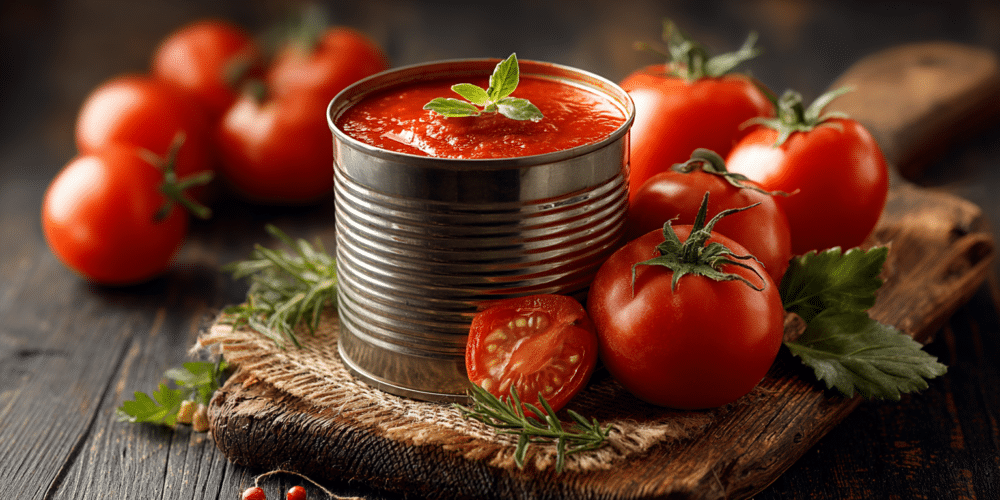
Salt is everywhere, and too much of it can cause your body to hold onto water. This extra fluid puts pressure on your prostate, making it harder for your urinary system to work right. It’s tricky because salt is hidden in so many processed foods, bottled sauces, snacks, and even bread. Back in ancient Rome, salt was so valuable it was used as money, which is where the word “salary” comes from. But today, it’s in almost everything we eat.
When you eat a lot of salt, your body retains more water, which means more urine and more trips to the bathroom. This also puts more pressure on an already enlarged prostate, making symptoms like a weak stream or incomplete emptying even worse. To help your prostate, try to cut back on processed foods and take the salt shaker off the table. You can use herbs and spices like rosemary, thyme, or oregano to flavor your food instead. Cooking methods like roasting, steaming, or light sautéing can also bring out natural flavors without needing extra salt.
➡️Processed and Red Meats
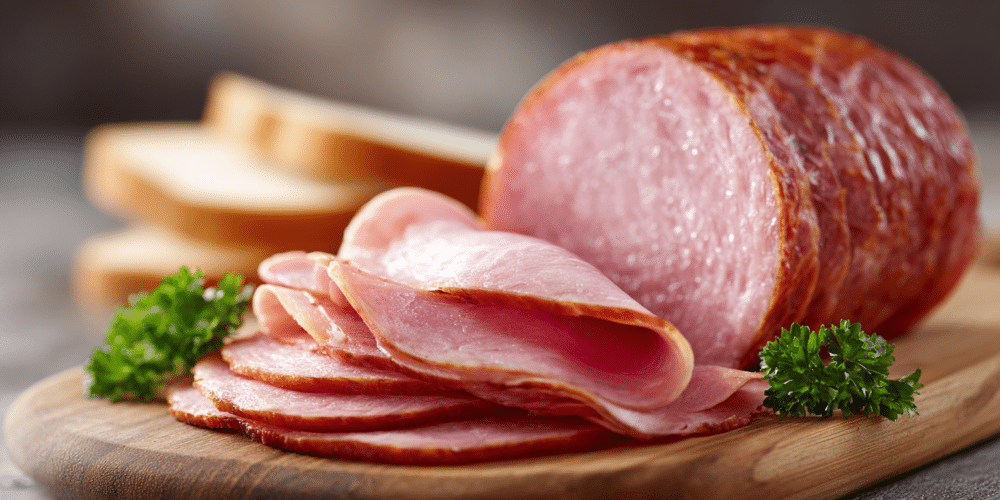
Just like dairy, processed and red meats have been linked to a higher risk of an enlarged prostate. One reason is their high content of saturated fats, which can cause inflammation. Another big issue with processed meats, like sausages or deli meats, is the preservatives they contain. Nitrates and nitrites are used to make these meats last longer and look appealing, but over time, they can damage prostate cells. These chemicals act like little irritants, slowly wearing down the prostate tissue.
➡️Sugary Foods

Sugar is in so many things we eat daily, from sauces to breakfast cereals and even drinks. When you eat sugary foods, your blood sugar spikes, and your pancreas releases a lot of insulin to handle it. Insulin doesn’t just regulate sugar; it also acts as a growth signal for many tissues in your body, including the prostate. So, every time your insulin levels go up, it’s like telling your prostate to grow more than it should. Sweets, cookies, sodas, and anything that quickly raises your blood sugar can directly affect your prostate. Plus, sugar can mess with your body’s hormone balance, making prostate issues worse over time.
Luckily, there are natural ways to sweeten your food without refined sugar. Dates, berries, or even cinnamon can add sweetness without causing those insulin spikes.
➡️Trans Fats
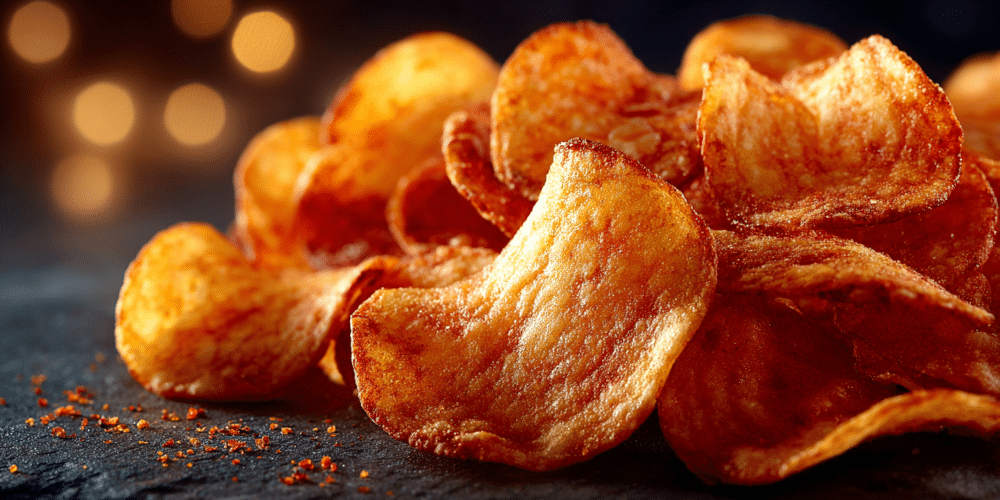
Trans fats are common in processed foods but offer no health benefits. These fats are made when liquid vegetable oils are turned into solid fats through a process called hydrogenation. This makes them last longer and look better. Think of it like putting the wrong kind of fuel in your car’s engine; it might seem fine at first, but eventually, parts will wear down and fail. The same goes for your prostate when you regularly eat industrial pastries, cookies, or potato chips. To keep your prostate healthy, swap these out for natural alternatives rich in healthy fats. Avocados, nuts like walnuts or almonds, and extra virgin olive oil are great choices for getting the fats your body needs.
➡️Ultra-Processed Foods
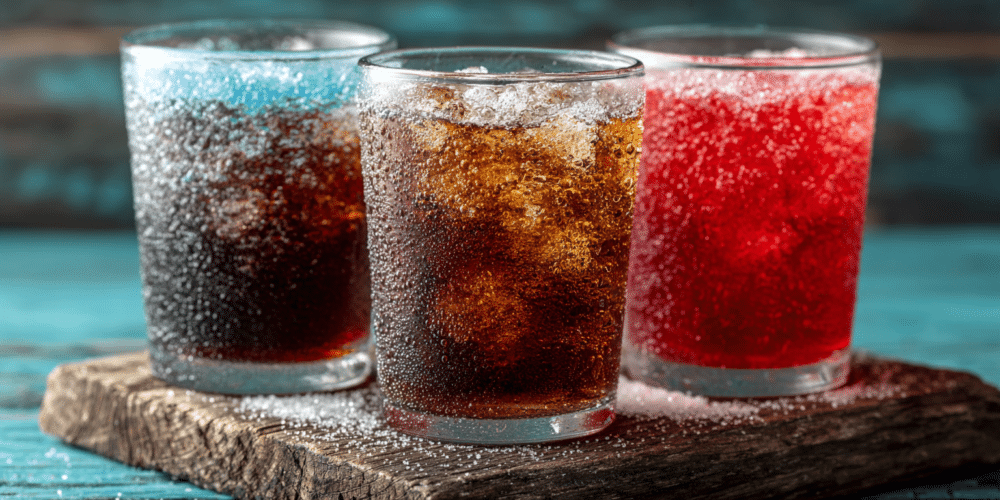
Ultra-processed foods include sugary drinks, refined cereals, and ready-made meals that fill supermarket shelves. The problem with these items (and I don’t call them “foods” because they don’t really nourish you) is that their mix of ingredients creates a perfect storm for inflammation. They lack the fiber, vitamins, and minerals your prostate needs to stay healthy. On top of that, artificial preservatives and colors can trigger an inflammatory response in your body. This inflammation, combined with the oxidative damage from these synthetic ingredients, can harm your prostate over time. To protect your prostate, try to identify ultra-processed foods in your diet. If you read a label and see a long list of ingredients you don’t recognize or wouldn’t find in your kitchen, it’s probably something you want to avoid for your prostate.
➡️Alcohol

Alcohol has a double negative effect on your prostate. First, it makes you urinate more often, which can irritate the prostate and worsen symptoms. Second, your liver, which filters toxins, also controls estrogen levels. When your liver is busy dealing with too much alcohol, it gets overloaded and can’t properly manage other functions, like controlling these hormones. This means estrogens can build up in your body, and when there’s an excess of these anabolic hormones, your prostate gets the signal to grow more than it should. The simple solution here is to drink alcohol sparingly, saving it for special occasions. When you do drink, make sure to stay hydrated to lessen the diuretic effects that can irritate your prostate.
✅Foods That Can Help Your Prostate
Now that we’ve covered what to avoid, let’s talk about the foods that can actually support your prostate health.
✔️Vitamin C-Rich Fruits
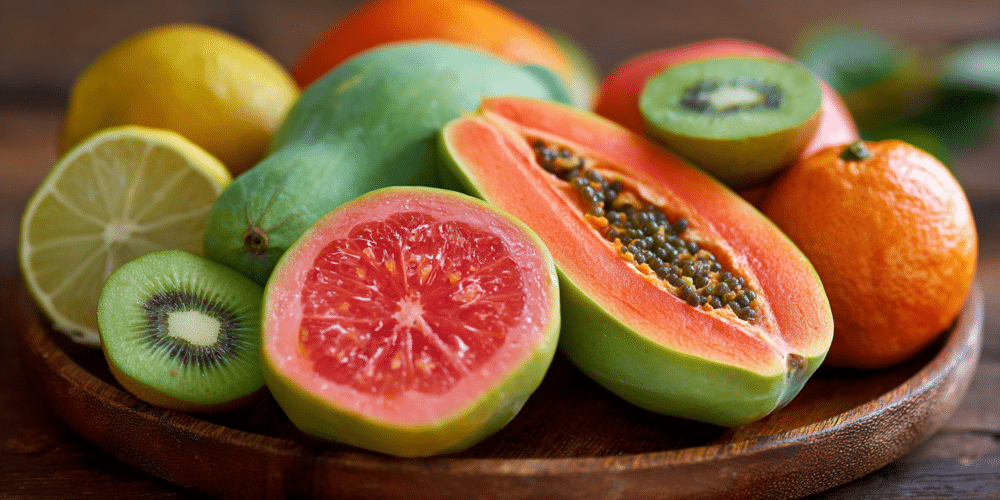
Fruits high in vitamin C offer great benefits for prostate health. Vitamin C acts like a shield, protecting prostate tissue from oxidative damage that happens as you age. These fruits are also important for your immune system, helping you recover faster from urinary tract infections and potentially easing symptoms like a weak stream or frequent nighttime urination. If you’re looking for the fruit with the most vitamin C, guava has five times more than an orange. Guava also provides fiber, which helps keep your blood sugar stable and can prevent prostate enlargement. Aim for one guava a day, but citrus fruits like oranges, lemons, kiwi, and papaya are also good options if you want variety. The most important thing is to eat these fruits whole, avoiding juices, which lose fiber and allow sugar to hit your system too quickly.
✔️Pumpkin Seeds
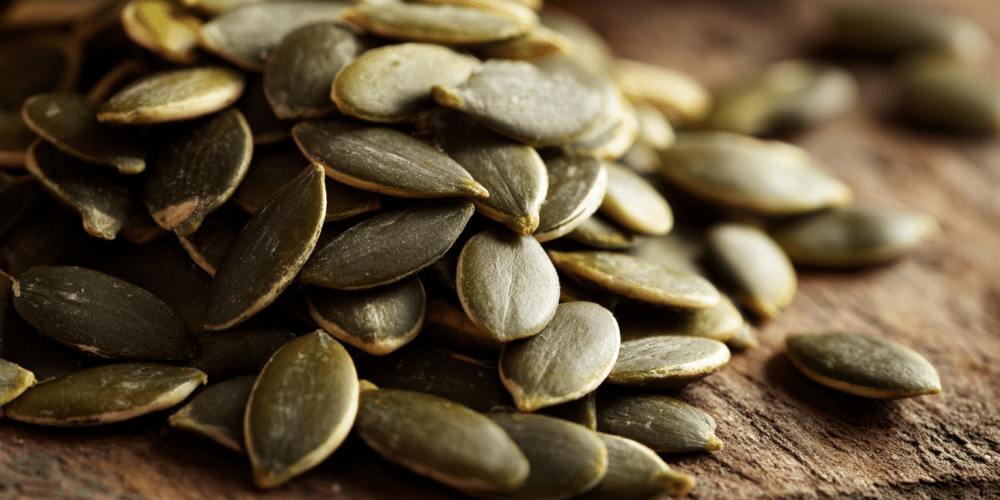
Pumpkin seeds are a treasure for prostate health because of their zinc content. Zinc helps regulate male hormones, especially DHT, a powerful form of testosterone that can increase prostate size. A healthy prostate has high levels of zinc, while an enlarged prostate often has lower levels. So, keeping your zinc levels up can be an effective way to protect your prostate. You can eat a handful (about 30 grams) of pumpkin seeds daily, either raw, toasted, or ground.
✔️Cruciferous Vegetables

Cruciferous vegetables like broccoli, cauliflower, and Brussels sprouts contain a natural substance that fights inflammation and prostate enlargement. What makes these vegetables so special is sulforaphane, a compound that acts like a guardian, reducing the risk of your prostate growing too much. Broccoli stands out among cruciferous vegetables for its high concentration of this compound. To give your prostate this protective shield, try to include broccoli in your meals at least three or four times a week. To get the most out of broccoli, cut it and let it sit for a few minutes; this activates an enzyme that releases sulforaphane. Then, steam it for no more than 5 minutes, as this compound is sensitive to heat.
✔️Tomatoes
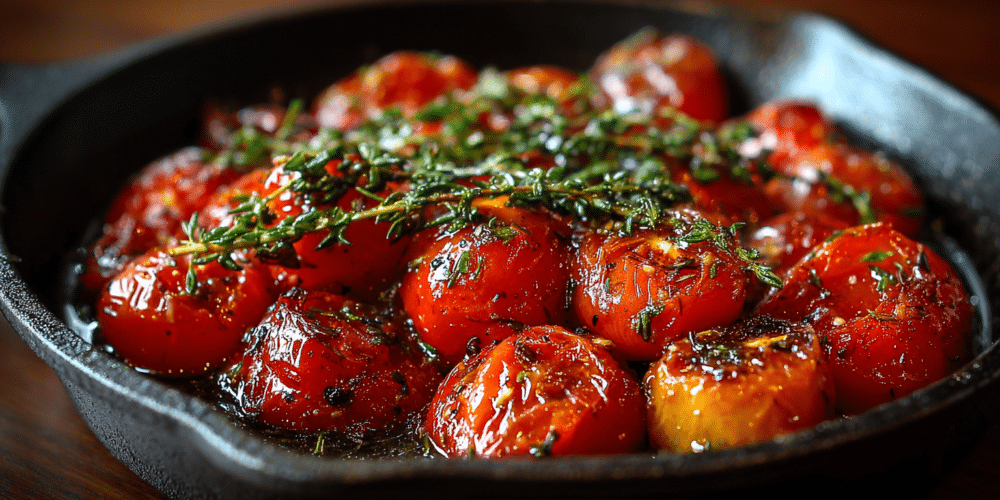
Tomatoes hold great potential for improving prostate health. Their star player is lycopene, a substance that not only gives them their vibrant red color but also acts as a shield, strengthening prostate gland cells. Studies show that men who eat more lycopene-rich foods have lower levels of inflammatory markers in their blood, which is linked to better prostate health. What’s unique about tomatoes is that they need heat to release their full anti-inflammatory power. If you eat them raw, your body only absorbs a small amount of lycopene. But when you cook them or eat them in a sauce, the nutrients become more available, and you get the most out of their properties. So, it’s a good idea to include a cup of homemade tomato sauce in your meals three or four times a week. Roasted or sautéed tomatoes with a little olive oil also work well.
✔️Nettle
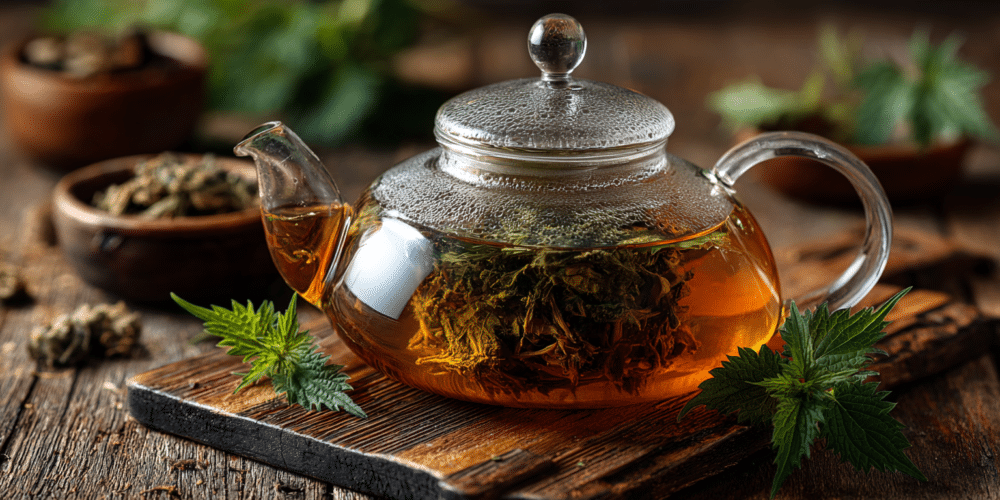
Nettle is a medicinal plant that has been used for centuries to treat urinary and prostate problems. During World War I, when cotton was scarce, nettle even became an important source of fiber for making uniforms. While many might see it as just a weed, nettle contains a lot of bioactive compounds for our prostate, like phenolic acids and lignans, all with strong anti-inflammatory and antioxidant properties. Prostate tissue is very sensitive to pollution, stress, and daily toxins, and nettle forms a barrier that protects it from these attacks, preventing the tissue from becoming inflamed and damaged. Men who regularly consume nettle extract often see an improvement in BPH symptoms, such as urinary frequency, urgency, or a weak stream. This is because nettle seems to work similarly to some prostate medications, preventing testosterone from converting into dihydrotestosterone, the hormone that stimulates gland growth.
Nettle can be consumed in several ways: as an extract, supplements (under medical supervision), or as a tea, which is the most accessible way to prepare it at home. To make nettle tea, boil a cup of water. Place a teaspoon of dried nettle root in another cup or teapot. Once the water is boiling, pour it over the root. The key is to let it steep for 15 minutes so the active compounds are released into the water. After 15 minutes, strain the tea, and it’s ready to drink.
Understanding what you eat can have a big impact on your prostate health. By making some simple changes to your diet, you can help manage symptoms and support this important gland. Remember, this information is for general knowledge, and it’s always a good idea to talk to your doctor about your specific health concerns.
Source: Dr. Iñigo Martín

